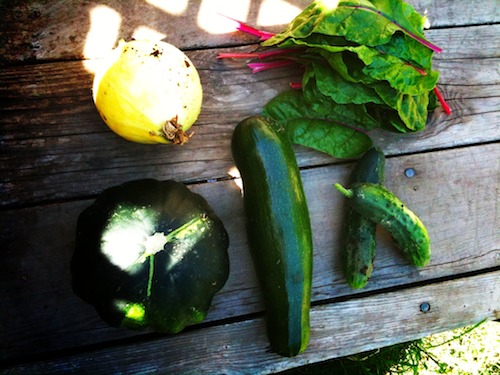One of the most amazing things about the process of our economic downsizing has been how embraced and supported we feel by our friends, neighbors, and surrounding community. We share our gardens’ harvests with each other and pass lawn tools back and forth. We borrow friends’ vehicles on rare occasions, and impose upon others’ Costco memberships. Our household has gotten by with no Internet connection thanks to the generosity of neighbors and their Wifi, and the availability of free-floating signals from the library that we can catch on occasion. It seems, here, that if we raise our hand and say, “I need this. Can you help?” that our community collectively answers “yes.”
That’s why it has been so surprising on the rare occasion that we’ve been betrayed by that same community. Theft is one way your neighborhood can betray you. A couple months ago, we got our new bicycle trailer stolen from in front of our house. We don’t have a garage, and during the dry California summer it is tempting to park our bicycles outside sometimes, versus leaning them against each other in a tangled mass of metal in the dining room. It is hard to lock both a bicycle and a trailer; you need a really long cable. On the day in question, my cruiser was locked to the front porch post, but the trailer was only attached to my bike frame and was not secured in any other way. It got stolen. We had bought it new from the local bike store when we sold our car. Our younger children were kept safe and comfortable in it, and it was so hard to explain to them that someone saw fit to steal their carriage from the safety of our front yard.

That night, and for virtually all nights since, I’ve closed and locked all our windows, although it makes our un-air-conditioned house hot and stuffy. Suddenly it seemed like our community didn’t have our best interests at heart after all. People often complain that this is the worst part of being victimized by crime: the new awareness that anyone around you can have malicious intentions. We live in a triangle of downtown that includes a soup kitchen, a gorgeous hiking trail with shady spots and well-concealed homeless encampments, and a large park that draws what I affectionately think of as old-school hoboes. It’s not unusual for a leathery old dude to stop by and pull a few apples off our tree, and of course we think nothing of it. A minivan packed with a large Russian family actually parked in front of our house the other day and partook of the apples as well as the neighboring pears. It didn’t feel like thievery. They were not stealthy—in fact, their good-natured casualness was deeply satisfying to my inner hippie. We actually opened the front door and greeted them, offered our extension ladder. The trees belong to all of us. On this one block of residential downtown, we have the following fruiting trees: cherry, apple, pear, Asian pear, orange, almond, apricot, and lemon. When you need rosemary to season your dinner, you wander over to the nearest neighbor who has it growing in front of their house.

I got mugged at knifepoint when I lived in New York City in the early nineties. It was a bitter betrayal, because I felt my hairs raise on the back of my neck when I saw the men who were waiting to attack me, but decided to ignore what I thought was elitist alarmism. In reward for this I got a cherished cheap Walk-Man stolen, along with an even more cherished mix tape made by my a very close friend—I still miss it and mourn its loss. They took all my money, which was sixteen dearly-needed dollars. The most vivid memory I have of the night is sitting in the back of the black-and-white cruising the neighborhood with the cops and tasting the salt from the sweat of the perpetrator where he had held my mouth closed. Thievery is intimate. Someone decides that you own something that they need more than you do, even if it belongs to your young children.
This community trust extends to the business choices we make. Our family boycotts the big-box stores that are making political choices that contradict our values. Whenever we can, we buy things at locally-owned shops, especially for big and important purchases. When we made the major decision to switch to a car-free lifestyle, we also made a conscientious choice to spend all the money needed to outfit ourselves with bikes, trailers, helmets, locks, and other accoutrements at a locally-owned cycle shop. We needed them to be our pit crew for our new way of doing things, and understood the merit of establishing a relationship with a small retailer that understood our needs and valued our business.
Sadly, that was a good intention that has caused endless frustration. Since March, the cycle store that we so carefully chose has failed us at absolutely every turn. From the very beginning, when I placed my special order for my Electra Super-Deluxe Cruiser, it took four or five unreturned phone calls and vague answers before I finally had to go retrieve it myself, ten miles away at a warehouse, and ride it home in a torrential downpour.
I’ve never been That Kind of Customer. You know: the one who purses her lips and asks for her coffee “from the fresh pot,” as if good service is always being dangled jealously out of reach. I’m easy. I don’t make greed-driven requests. I didn’t ask for a discount when we bought our entire fleet of pedal-powered car replacements from their store. I have spent many years tending to the entitled customers at fancy retailers as both a sales-floor grunt and an ambitious brand representative. It is part of my self-identity to keep my demands low and my demeanor humble when doing business. This is part of what I consider to be the currency of this sort of relationship, and (I assumed) would lead to us having a reliable port in this uncharted storm of living sans car.
When I am very angry, I cry. I’m afraid it’s something a lot of women do. I have to steel myself to call them—usually for the fifth or sixth time about the same unresolved issue—because I keep fighting tears and a lump in my throat. It’s embarrassing to feel so hurt and frustrated over something as seemingly inconsequential as a broken bike seat or malfunctioning brakes, but this is the thread that keeps me hanging on to the notion that I haven’t failed my family by losing so many luxuries. We rely on this little cycle store for so much of our comfort and safety now.
Well, really, my family relies on me. My children need me to keep things in order, and to make sure they are ferried where they need to go with reasonable ease. Having a handsome, new, fuel-efficient, ultra-safe car waiting like a sturdy and reliable friend was a comfort as a parent; it was visible reassurance of our success and well-being. Now I rely on others to keep the illusions of this humble life sparkling and serene by simply allowing us to keep what we have, and to keep it in running order. I'll trade apples for that.
This essay appears in the new Shareable ebook collection Share or Die, which is now available in downloadable and free online forms. For the next piece in Share or Die, Mira Luna's "How to Start A Housing Co-op" click here.









